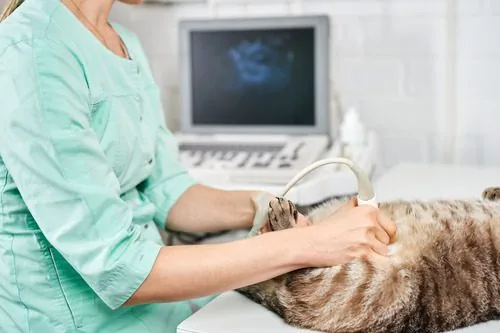10 Tips on How to Train a Cat
Did you know that you can train more animals than just dogs? Well, it’s true! In addition to dogs, you can train ferrets, bunnies, and even cats! In fact, training your cat may be easier than most cat owners think it is. So, what are some cat training tips?
When training a cat it is best to stay positive and consistent. This will prevent you from overwhelming or confusing your cat. It is also a good idea to keep training sessions with your cat short and sweet since they will start to lose interest after just a few minutes.
Here we will be giving you our top ten tips for training a cat. We will also be explaining how long it takes to train a cat on average. Alright, let’s dive right into it!

Can Cats be Trained?
Yes, cats can definitely be trained. However, the process is not as easy as training dogs, so it is important to manage our expectations a bit when it comes to cat training.
Still, cats can be trained to do tricks. You can also use cat training as a way to stop your cat from engaging in problematic behaviors like biting or scratching furniture.
10 Tips For Training Cats
Though the task may seem daunting to some cat owners, you can train a cat. When you follow our ten tips, you are sure to get some headway on training your cat. Here are our top ten tips on how to train your cat.

1) Have a Goal in Mind Before You Start
The best thing that you can do when training a cat is to get into a good headspace beforehand. It is a good idea to have a set goal in mind for that training session, and having a long term goal on where you would like to get your cat with training is a great idea too.
Doing this will help you have a plan to follow during your short training session. It will also prevent you from confusing your cat when you have a concrete goal in mind.
2) Start as Early as Possible
While it is not impossible to train an adult cat, it tends to be easier to train a kitten. As a result, it is a good idea to start training when your cat is still a kitten whenever possible. This is because kittens tend to soak up information more quickly than adult cats do.

3) Only Teach One Thing at a Time
It is always best to focus on one trick or behavioral issue at a time when training a cat. This is because training your cat to do too many things at once could easily confuse them. When a cat is confused during training, there is a high probability that it will take them longer to learn the things that you are teaching them.
4) Keep Training Sessions Short
Cats lose interest pretty quickly most of the time. As a result, it is a good idea to keep your training sessions short. Most cat trainers keep their training sessions somewhere between 30 seconds and 5 minutes. In fact, most of the time you will be lucky to even reach that five minute mark.
During training, keep an eye on your cat’s body language. If they seem to be losing interest, then it is a good idea to wrap up that training session.
5) Train Around as Little Distractions as Possible
Cats can be easily distracted as well. This means that it tends to be very difficult to train them around many distractions. Taking your cat to a room with as few distractions as possible will make training sessions longer and make it easier for you to teach your cat new things.
6) Have Plenty of Treats Handy
Most animals learn best with positive reinforcement. This involves rewarding good behavior with treats, toys, and praise. Since cats have short attention spans, treats are usually a much better form of positive reinforcement than toys. So, be sure to have plenty of cat treats on hand!
7) Always Use Positive Reinforcement
As we have just mentioned, cats respond much better to positive reinforcement training methods than training that primarily involves punishment. As a result, it is best to stay as positive as possible during training, and it is also important to reward any good behavior from your cat. Only use punishing bad behavior as an absolute last resort, and it is really best to avoid it altogether whenever possible.
8) Be Consistent With Your Training
Like with training any other kind of animal, it is very important that you stay consistent with your words and expectations when training a cat. This is because cats can easily be confused when you change things up out of the blue.
As a result, it is always a good idea to use the same hand signals and verbal commands when training a cat. It is also best to remain consistent with things like rules and alternative behaviors when training out bad habits.
9) Practice Makes Perfect
You will always need to practice tricks multiple times before a cat learns them. The same goes for correcting bad behavior. The cat will need to be taught the right thing to do multiple times before they start to do it for themselves. Remember, practice always makes perfect when it comes to cat training.
10) Try to Not Get Frustrated

When training a cat, it is sometimes easy to get frustrated, especially when the cat won’t listen. Whenever this happens it is best to take a break to prevent you from confusing your cat or getting angry. Once you have had some time to cool off you can try again. Not every cat will learn things at the same rate, so some cats will take much longer to train than others.
How Long Does it Take to Train a Cat?
Every cat will learn at their own pace, and some cats will learn more quickly or slowly than others. Still, you can expect it to take at least ten training sessions for your cat to learn something new most of the time.
Conclusion
Although training your cat may seem difficult, it can be a lot easier than you think! Remember to be patient, consistent, and keep training sessions very short. If you have further questions regarding cat training, reach out to your veterinarian.
For cat parents in Winter Haven, FL, Veterinary Healthcare Associates offers 24/7 veterinary, specialty, and emergency care. Give us a call today at (863) 324-3340 or visit us online!
Are you interested in a career with Veterinary Healthcare Associates? We are looking for members to join our tribe. Visit our career page today!
Recent Posts
Why You Should Build Your Veterinary Career at Veterinary Healthcare Associates
Why You Should Build Your Veterinary Career at Veterinary Healthcare Associates Embarking on a veterinary career is…
French Bulldog Nose Surgery: Everything You Need to Know
French Bulldog Nose Surgery: Everything You Need to Know French Bulldogs are adored for their playful personalities…
Veterinary Diagnostic Imaging: How It Keeps Pets Healthy
Veterinary Diagnostic Imaging: How It Keeps Pets Healthy When it comes to protecting your pet’s health, veterinary…
How Much Does Hyperbaric Oxygen Therapy (HBOT) for Dogs Cost?
How Much Does Hyperbaric Oxygen Therapy (HBOT) for Dogs Cost? When your dog is facing a health…
Cat Sonogram & Ultrasound: Everything You Need to Know
Cat Sonogram & Ultrasound: Everything You Need to Know Cats have a way of concealing discomfort, making…
About Veterinary Healthcare Associates
Veterinary Healthcare Associates in Winter Haven, FL, was established over 30 years ago as Maxwell Animal Clinic by Dr. John Maxwell. Maxwell Animal Clinic was a one-doctor general practice offering preventive care, dentistry, and standard surgical services to the community. As the years passed, Maxwell Animal Clinic evolved into a thriving 10-doctor general, specialty referral, and emergency veterinary practice.








